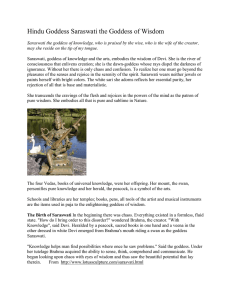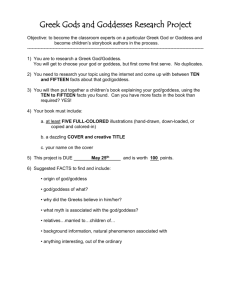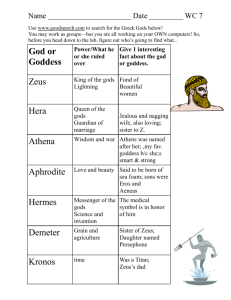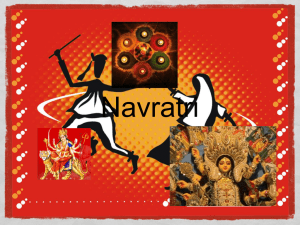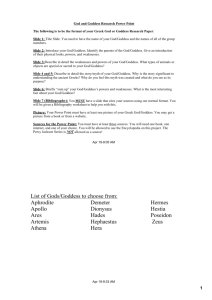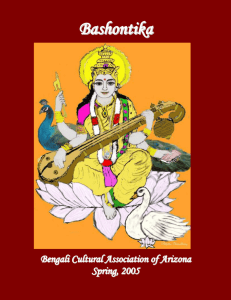SKAM Saraswathi
advertisement
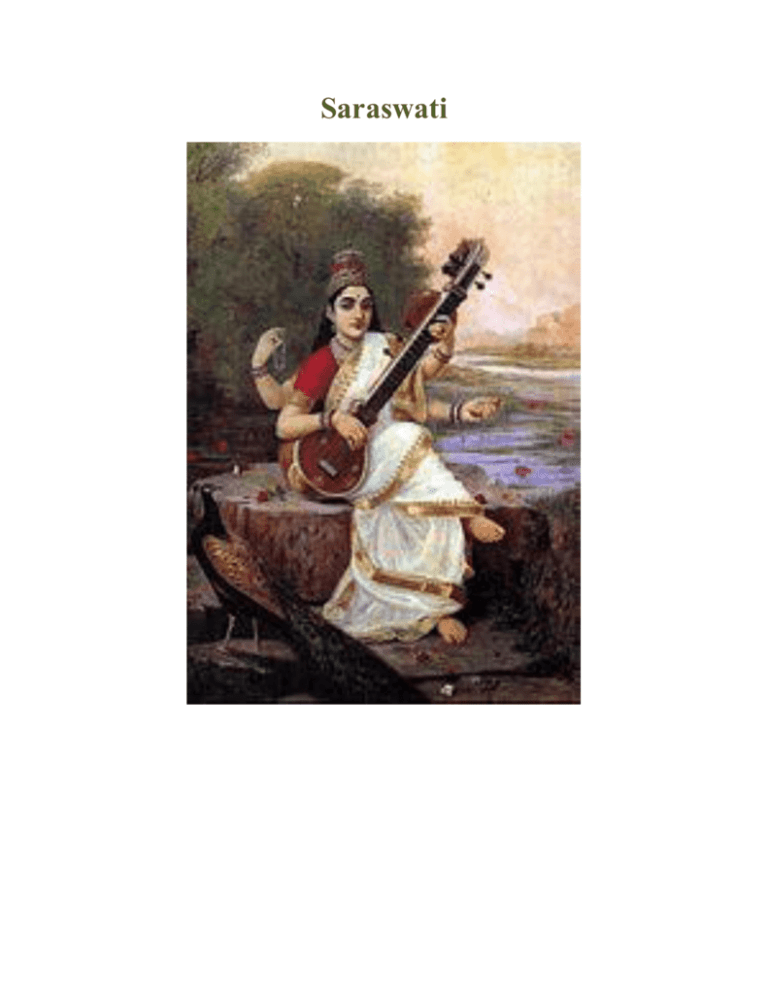
Saraswati Devanagari Sanskrit Saraswatī Transliteration Affiliation Devi (Tridevi) Abode Brahmapura Mantra Sri Sarasvatyai nāmahā Veena Name (Musical Instrument) = Kachapi Consort Brahma Mount Hansa Bird (Swan), and often peacock Saraswati (Sanskrit: सरस्वती, Sarasvatī ?) is the Hindu goddess of knowledge, music, arts, wisdom and nature. She is a part of the trinity of Saraswati, Lakshmi and Durga or Parvati. All the three forms help the trinity of Brahma, Vishnu and Shiva in the creation, maintenance and destruction of the Universe.[1] The Goddess is also revered by believers of the Jain religion of west and central India.[2] Names The Sarasvati River is an important river goddess in the Rigveda. The Sanskrit name means "having many pools". In the Telugu language, Sarasvati is also known as Chaduvula Thalli ( ( ), Sharada ). In Konkani, she is referred to as Sharada, Veenapani, Pustaka dharini, Vidyadayini. In Kannada, variants of her name include Sharade, Sharadamba, Vani, Veenapani in the famous Sringeri temple. In Tamil, she is also known as Kalaimagal ( ), Kalaivaani ( ), Vaani ( ), Bharathi. She is also addressed as Sharada (the one who loves the autumn season), Veena pustaka dharani (the one holding books and a Veena), Vaakdevi, Vagdevi, Vani (all meaning "speech"), Varadhanayagi (the one bestowing boons). Characteristics Saraswati is strongly associated with flowing water in her role as a goddess of knowledge. She is depicted as a beautiful woman to embody the concept of knowledge as supremely alluring.[4] She possesses four arms, and is usually shown wearing a spotless white sari and seated on a white lotus or riding a white swan.[citation needed] History Saraswati goddess is found in temples of Southeast Asia, islands of Indonesia and Japan. In Japan, she is known as Benzaiten (shown).[5] She is depicted with a musical instrument in Japan, and is a deity of knowledge, music, and everything that flows. In the Rigveda, Saraswati is a river as well as its personification as a goddess.[citation needed] In the post-Vedic age, she began to lose her status as a river goddess and became increasingly associated with literature, arts, music, etc. In Hinduism, Saraswati represents intelligence, consciousness, cosmic knowledge, creativity, education, enlightenment, music, the arts, eloquence and power.[citation needed] Hindus worship her not for "academic knowledge", but for "divine knowledge" essential to achieve moksha. Saraswati, the goddess of knowledge and arts, represents the free flow of wisdom and consciousness. She is the mother of the Vedas, and chants to her, called the 'Saraswati Vandana' often begin and end Vedic lessons. It is believed that goddess Saraswati endows human beings with the powers of speech, wisdom and learning. She has four hands representing four aspects of human personality in learning: mind, intellect,[citation needed] alertness and ego. She has sacred scriptures in one hand and a lotus – the symbol of true knowledge – in the second.[citation needed] With her other two hands she plays the music of love and life on a string instrument called the veena. She is dressed in white – the symbol of purity – and rides on a white swan – symbolizing Sattwa Guna or purity and discrimination. Saraswati is also a prominent figure in Buddhist iconography – the consort of Manjushri. The learned and the erudite attach greater importance to the worship of goddess Saraswati.[citation needed] As a practice, only educated people worship her for knowledge and wisdom.[citation needed] They believe that only Saraswati can grant them 'moksha' – the final liberation of the soul.[citation needed] Saraswati's birthday – Vasant Panchami – is a Hindu festival celebrated every year on the 5th day of the bright fortnight of the lunar month of Magha. Hindus celebrate this festival with great fervor in temples, homes and educational institutes alike.[citation needed] The Forms of Saraswati Maha Saraswati In the Devi Mahatmya, Saraswati is in the trinity of Maha Kali, Maha Lakshmi and Maha Saraswati. She is depicted as eight-armed and is often portrayed holding a Veena whilst sitting on a white Lotus Flower. Her dhyāna shloka given at the beginning of the fifth chapter of Devi Mahatmya is: Wielding in her lotus-hands the bell, trident, ploughshare, conch, pestle, discus, bow, and arrow, her lustre is like that of a moon shining in the autumn sky. She is born from the body of Gowri and is the sustaining base of the three worlds. Mahavidya Nila Saraswati Nilasaraswati is another form of Mahavidya Tara. There are separate dhyana shlokas and mantras for her worship in Tantrasara.[7] Iconography The goddess Saraswati is often depicted as a beautiful woman dressed in pure white, often seated on a white lotus, which symbolizes that she is founded in the experience of the absolute truth. Thus, she not only has the knowledge but also the experience of the highest reality. She is mainly associated with the color white, which signifies the purity of true knowledge. Occasionally, however, she is also associated with the colour yellow, the colour of the flowers of the mustard plant that bloom at the time of her festival in the spring. Unlike the goddess Lakshmi, Saraswati is adorned with simple jewels and gold, representing her preference of knowledge over worldly material things.[8] She is generally shown to have four arms, which represent the four aspects of human personality in learning: mind, intellect, alertness, and ego. Alternatively, these four arms also represent the four Vedas, the primary sacred books for Hindus. The Vedas, in turn, represent the three forms of literature: Poetry — the Rigveda contains hymns, representing poetry. Prose — Yajur Veda contains prose. Music — Sama Veda represents music. Philosophy - Atharvaveda The four hands also depict this thus—prose is represented by the book in one hand, poetry by the garland of crystal, and music by the veena. The pot of sacred water represents purity in all of these three, or their power to purify human thought. She is shown to hold the following in her hands: A book, which is the sacred Vedas, representing the universal, divine, eternal, and true knowledge as well as her perfection of natural study and the scriptures. A mālā of crystals, representing the power of meditation and spirituality. A pot of sacred water, representing creative and purification powers. The veena, a musical instrument that represents her perfection of all arts and sciences. Saraswati is also associated with anurāga, the love for and rhythm of music, which represents all emotions and feelings expressed in speech or music. A white lotus,kamnadala is also depicted. The beautiful human form of Saraswati comes to the fore in this English translation of the Saraswati hymn: "May Goddess Saraswati, who is fair like the jasmine-colored moon, and whose pure white garland is like frosty dew drops, who is adorned in radiant white attire, on whose beautiful arm rests the veena, and whose throne is a white lotus, who is surrounded and respected by the Gods, protect me. May you fully remove my lethargy, sluggishness, and ignorance. "[9] A hansa / hans or swan is often located next to her feet. The sacred bird, if offered a mixture of milk and water, is said to be able to drink the milk alone. It thus symbolizes discrimination between the good and the bad or the eternal and the evanescent. Due to her association with the bird, Saraswati is also referred to as Hansvahini, which means "she who has a hansa / hans as her vehicle".The peacock is also related to her. She is usually depicted near a flowing river, which may be related to her early history as a river goddess. Sometimes a peacock is shown beside the goddess. The peacock represents arrogance and pride over its beauty, and by having a peacock as her mount, the goddess teaches not to be concerned with external appearance and to be wise regarding the eternal truth. Worship In Hindu beliefs, great significance is attached to offering honey to this goddess, as honey is representative of perfect knowledge. Hymns dedicated to her include Saraswati Vandana Mantra.
